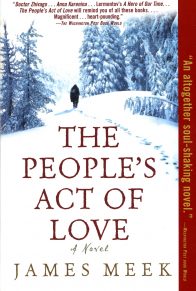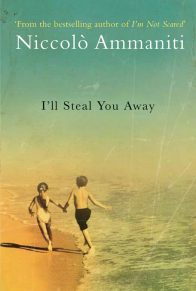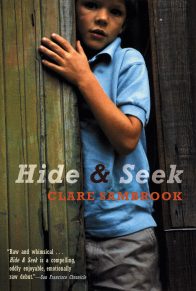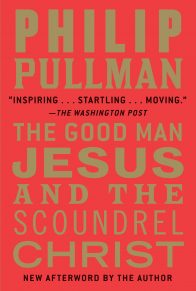I fly in my sleep every night. When I was little I could fly without being asleep; now I can’t, even though I practise and practise. And after what I saw last night I want more than ever to fly wideawake. Mam always says: I want never gets. Is that true?
Last night began like every other night. I went to bed and changed under the bedclothes so Buddy Holly couldn’t see me, and I laid my pink polka-dot hair ribbon down the middle of the mattress to show which side was whose, and Bethan said, like she always does: I don’t want to sleep on your old side, anyway.
Then, as soon as she was snoring she flung her arm across my face, and when I pinched her she swung her leg across my stomach.
So, it was hard to fall asleep. But when I did I left Bethan to spread herself across the whole bed and I soared into a sky that wrapped me in air as light and warm as an eiderdown.
I listened to the town below breathe its shallow night-time breaths, in and out, in and out, and all around me the Earth sang.
For a while I hovered above the town’s higgledy-piggledy houses. They cling to their streets as if they might roll all the way down to the sea and fall in if they let go. But last night, as usual, none of them let go and I didn’t have to save anybody. I swerved away and rose high to avoid the Red Dragon flapping against its pole above the castle gatehouse, and swooped low over the council houses and across the sands to the sea where the air is always thick with salt that crusts on my lips as if I’d that minute undone a blue twist from a bag of crisps and licked it.
The sea, too, breathed in and out, its breast swelling with each breath until I was half afraid that the Leviathan from the Bible would burst from its depths and shower me with spume. Whales, porpoises, mermaids and mermen, dead sailors, fishes, crabs, tiny shrimps; the sea is forever full of eyes that watch me. I never fly far beyond the shore. If my town were a map the bay would have Here be Monsters written on it in golden ink.
Like every other night, I sped from the sea to drift along the road that winds its way beyond the Baptism Pool and the Reservoir high into the hills behind the town. As I passed above the Pool I saw a man floating in it with his arms outstretched and the moon
Drowning in his eyes. That was not like every other night and the fright plummeted me back to my bed, right on top of Bethan. I couldn’t push her to her own side to make room to lie down so I got up early to practise wide-awake flying.
It’s cold down here in the living room so I fasten up all the buttons on my cardigan. I need to be high up and Tada’s armchair has the highest seat, but the cushion is old and saggy and it’s difficult to balance on it. When I glimpse my reflection in the looking glass above the fireplace I see a scarecrow frowning at me, a skinny arm sticking out each side and red hair erupting from her head. Tada says it’s the family hair, but Mam always says: Pity you have that old family nose to go with it. It’s best not to look in the mirror too long in case the Devil appears in it so I scrunch my eyes closed until I feel the freckles pop on my cheeks. The tick-tock of the brown clock on the mantelpiece is loud and the tap that Tada has mended three times drip-drips in the scullery. Fly, I tell myself. Fly, fly, fly. Slowly, the sounds fade and I feel warm and weightless. I’m just about to rise from Tada’s chair, light as an angel, when Mam’s slippers go slap on the stairs and I fall off the seat.
John Morris opens an eye and squints at me from the other armchair.
“I nearly did it,” I whisper to him. “Really.”
He purrs, then wraps his tail around his face and goes back to sleep.
I pull The Tiger in the Smoke that Aunty Lol lent me from beneath the saggy cushion, blow some Marie biscuit crumbs from the pages, and curl up tight as a fist in Tada’s armchair to read it.
As soon as Mam comes through the living room door she sniffs so hard I can hear the hair clips on her yellow pincurls chatter against each other.
“It smells sooty in here,” she says, “and it’s chilly. You could have made the fire instead of sitting there with your beak in a book.”
“I don’t like lighting the matches. You know that.”
“Don’t be silly, Gwenni.” She kneels down and begins to riddle the half burnt lumps of wood. Clouds of fine ash billow around her. “A girl of thirteen,” she says, and sighs. I uncurl and push my book back under the cushion. “Twelve and a half,” I say.
Mam rams the half full ash pan back into place and crumples newspaper into the grate over which she lays a grid of kindling and three logs. The matches sputter and die but at last the paper catches light and the wood begins to crackle. Mam stands up and shakes the folds of her blue satin dressing gown. The stale scent of Evening in Paris drifts from them with the ash. I try to hold my breath but I feel a throb above my eyebrows, like the ghost of the dripping tap, and the back of my neck stiffens. I rub it with a cold hand, and remember what I saw in the scullery when I got up.
“There’s a mouse caught in the trap,” I say.
“Dead?”
“I think so.”
“A dead mouse won’t hurt you.”
“I’m not afraid of it. I just don’t like touching it.”
Mam takes the empty wood box into the scullery. Through the door I watch her as she crouches by the trap. John Morris follows her and she pushes him away with her elbow, then eases the spring from the mouse’s broken back and picks up the body.
“Nain said she pulled a mouse out of a trap by its tail like that once. It was only pretending to be dead and it swung right round and bit her thumb,” I tell her.
Mam carries the corpse out through the back door and throws it into the bin. “Nasty, dirty thing,” she says and slams the bin lid over it.
She washes her hands under the dripping tap and says, “Bring in the kettle to fill, Gwenni. The fire’ll be hot enough. Your father’ll be wondering where his cup of tea’s got to.”
I take the kettle into the scullery. The green distemper on the walls is beginning to peel and flake, shaping faces with sly eyes and mouths tight with secrets. There are new faces there every day. I try not to see them watching me.
“Mam,” I say, “when I was flying last night I saw something that scared me.”
Mam fills the kettle and puts it on the fire in the living room.
Her hands shake and some of the water slops over onto the logs, making them hiss.
“In the Baptism Pool,” I say.
“Don’t talk rubbish,” says Mam. “And I thought I told you I didn’t want to hear about that flying nonsense again. You haven’t been telling anyone else about it, have you?”
“I asked Aunty Lol if she could remember me flying when I was little.”
“How many times do I have to say it, Gwenni? People can’t fly.”
“But I can remember it. I can, really. You and Aunty Lol were holding my hands and swinging me and then you let go and I just flew along the ground without touching it. Like this.” I crouch and fold my arms around my legs.
Mam grasps my arm and yanks me up. “Stop that. Stop that,” she shouts. Her dressing gown slithers open and she pulls it tight around her and takes a shaky breath.
“Listen to me, Gwenni. It never happened; that was a dream, too. Don’t you dare say anything to anyone about it again.”
“Why not?” I rub my arm where Mam has squeezed it.
“You don’t want people to think you’re odd, do you?”
“Odd?”
“Yes, odd. Touched. Funny in the head. Like Guto’r Wern.”
The kettle lets out a gentle steam, blinding the window, shutting out the rest of the world.
“People won’t think I’m like Guto just because I can fly in my sleep,” I say.
“Dreaming is one thing. Saying you really do it is another. What did Aunty Lol say?”
“She said perhaps I was a witch.”
“You see what I mean?” says Mam. Her knuckles turn white as she tightens the dressing gown’s sash around her waist.
The kettle belches steam in great snorts.
“Fetch the tea tray,” says Mam and takes it from me when I bring it into the living room. The cups and saucers rattle on the tray. It’s early for Mam’s nerves to be so bad. She sets the tray down on the table, then picks up the milk bottle from it and pushes it in front of my face.
“You’ve given John Morris the top of the milk again,” she says.
“He likes it,” I say.
“So does everyone else,” says Mam. “I’ve told you before not to waste it on the cat. I may as well talk to the man in the moon.”
She bangs the bottle down on the tray and scoops tea into the teapot. Two scoops. She lifts the kettle from the fire, holding it away from her to keep the soot from her dressing gown, and pours the water into the pot.
“So, promise me you won’t say anything to anyone about it,” she says.
“About what?” I say.
Mam’s hand shakes again as she puts the lid back on the teapot. “This flying nonsense.”
“Not even to Alwenna?”
“Certainly not,” says Mam.
“But she’s my Kindred Spirit. I want to show her how to fly, once I remember.”
“Not Alwenna. It would be all round the council houses in no time. Cross your heart.”
I make a big cross over my heart. But I cross my fingers at the same time. Alwenna already knows about the flying I do at night. “Cross my heart,” I say. “And hope to die.” I drop down into Tada’s armchair and pull out my book.
Mam slips the knitted cosy over the teapot. “Don’t start reading now. You’ve got to get cracking this morning.”
“Why? I can’t change the beds if Tada and Bethan are still in them.”
“Bethan can do that today. I’ve promised you to Mrs Evans Brwyn Coch this morning to look after the two girls.”
“I hate going to Brwyn Coch.”
“Don’t be silly. You like the children.”
“But I don’t like Mr Evans.”
“Don’t like Ifan Evans?” Mam stops pouring milk into the cups. “He’s a wonderful man. Well respected. I only promised you to Elin as a favour to him.”
“His face is too red.”
“He can’t help his red face, Gwenni. It’s because he’s out in the fields all day.”
“He’s just like those Toby jugs.”
Mam looks up at the three jugs on their shelf above the looking glass. Straightaway, the Toby jugs pretend they’re not staring at the china woman that Mam and Tada were given as a wedding present by their best man who died in the war. The china woman stands on the sideboard and doesn’t wear any clothes at all, not even knickers. When the Toby jugs watch her they forget to smoke their pipes or drink from the tankards in their hands and their fat cheeks turn redder and redder and their eyes grow darker and darker.
“Mr Evans doesn’t smoke or drink,” Mam says. “Chapel deacons aren’t allowed to.”
“Do I have to go?” I say.
“I said you’d be there by half past nine,” says Mam. “Mrs Evans has to go to Price the Dentist. He’s in town this morning, but only for a couple of hours. So hurry yourself.”
“Don’t make me go, Mam.”
Mam lifts the teapot and pours a steaming brown stream into each cup.
“Don’t be silly,” she says. “Now, have your cup of tea, brush that hair and get your Wellingtons on.”
“But it’s not raining.”
“The fields will still be wet after the snow. I’ll take this tea up to your father and wake Bethan. I want you in your Wellingtons ready to go when I come down.”
Mam picks up the biggest cup and saucer, the ones with A Present from Llandudno written on them in gold, and opens the living room door. The cup trembles on the saucer. She looks back at me. “You have to go,” she says.
The door closes behind her and I listen to her slippers slapslapping all the way up to the bedroom.












